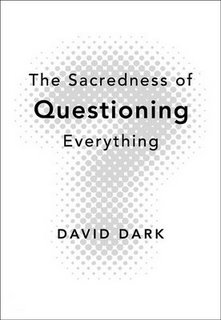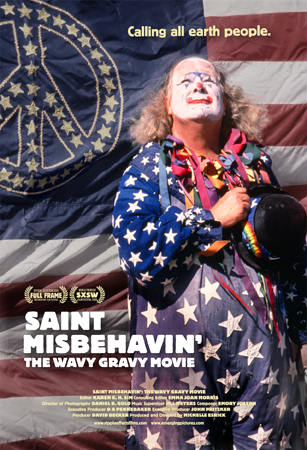 I am a European, and therefore an inheritor of a tradition that includes both life-enhancing, humanising political dissent (Mennonites and Amish, the Reformation, the anti-slavery movement) and racist, destructive control (conquests both political and economic, slavery, genocide). I am a European, and so, even though I was not born when it happened, the 1973 seige at Wounded Knee, South Dakota, when locals from Pine Ridge co-operated with the American Indian Movement and others to control a town to make their case for justice, feels like it has something to do with me. That, right now, as a northern Irish British citizen emigrant to the United States, I benefit from a system that disenfranchises first nations people to the present day. (I suppose I could also say that as an emigrant I may also identify with the notion of being marginalised, but I wouldn't want to stretch the point. Right now I'm in a nice hospitality suite, eating a croque monsieur, and covering a film festival for goodness' sake.)
I am a European, and therefore an inheritor of a tradition that includes both life-enhancing, humanising political dissent (Mennonites and Amish, the Reformation, the anti-slavery movement) and racist, destructive control (conquests both political and economic, slavery, genocide). I am a European, and so, even though I was not born when it happened, the 1973 seige at Wounded Knee, South Dakota, when locals from Pine Ridge co-operated with the American Indian Movement and others to control a town to make their case for justice, feels like it has something to do with me. That, right now, as a northern Irish British citizen emigrant to the United States, I benefit from a system that disenfranchises first nations people to the present day. (I suppose I could also say that as an emigrant I may also identify with the notion of being marginalised, but I wouldn't want to stretch the point. Right now I'm in a nice hospitality suite, eating a croque monsieur, and covering a film festival for goodness' sake.)
'Wounded Knee', Stanley Nelson and Marcia Smith's telling of the story weaves the distant and recent past in the narrative - it's a potted history of the American Indian, so we get forced boarding education, the original Wounded Knee massacre, and the breaking of treaties alongside found footage of the 71 day long siege. Contemporary interviews with the protagonists - from the Indian leaders of the siege to the FBI agents tasked with resolving the conflict - add more flavour than is often the case with this kind of film.
'Wounded Knee' is something more than a linear re-telling of an under-familiar story; the sorrow of the history of how this people has been treated by the nation that has sometimes seemed to claim for itself a monopoly on freedom is palpable. In that sense it's an important document; it might seem churlish to raise questions like the ones I'm about to pose, but they were the ones that occurred to me while watching.
Is the lionisation of warrior traditions a necessary part of the process whereby an oppressed people's dignity is asserted? In other words, do you have to endorse the use of violence just because it is employed by people who are suffering on the vulnerable end of a power dynamic? Let me be clear: the film's sympathies lie where they should - with the people who suffer. And its failure to ask whether the violence is justified does not equal an endorsement.
But those questions - which of course predate the suffering of American Indians, and doesn't show too many signs of going away any time soon - shouldn't get in the way of the rest of this film's context.
Brush strokes:
Dennis Banks declaring that his anger toward the government derives from the fact that his forcible boarding school education led to him never being able to regain the friendship he had with his mother.
The desperation that leads to a representative voice crying 'I believe that the time has come when we have to commit violence in order to be heard'
The fact that the owners of the looted trading post at Wounded Knee refused to leave, stating that, contrary to the government's assertion, they were not hostages, and that they would stay put until the demands of the siege operators were met.
As I've said, the value of this film is in the fact that it gives context to the reasons for why the siege happened. The fact that it doesn't ask whether or not the tactics were justified is, in some senses, probably a matter of my own preoccupations (although I do wish for more documentaries about responses to injustice that rely on force to be more inquisitive about the means/ends journey). At the end, when the death toll has been counted (2 Indians dead during the seige; 60 in its aftermath, leaving Pine Ridge with the highest per capita murder rate in the country), and the elder statesmen and women of the movement have said their piece, one thing is clear: there is unfinished business to attend to.
 My friend David Dark has a new book out. It's called 'The Sacredness of Questioning'. It's a philosophical-theological-psychological-communitarianistical-nashvillianestical-cinematical-musical thrill ride. It mentions the Coen Brothers, Flannery O'Connor, Tom Waits, and the mysterious figure who lives in the basement known as Uncle Ben.
My friend David Dark has a new book out. It's called 'The Sacredness of Questioning'. It's a philosophical-theological-psychological-communitarianistical-nashvillianestical-cinematical-musical thrill ride. It mentions the Coen Brothers, Flannery O'Connor, Tom Waits, and the mysterious figure who lives in the basement known as Uncle Ben.
 I am a European, and therefore an inheritor of a tradition that includes both life-enhancing, humanising political dissent (Mennonites and Amish, the Reformation, the anti-slavery movement) and racist, destructive control (conquests both political and economic, slavery, genocide). I am a European, and so, even though I was not born when it happened, the
I am a European, and therefore an inheritor of a tradition that includes both life-enhancing, humanising political dissent (Mennonites and Amish, the Reformation, the anti-slavery movement) and racist, destructive control (conquests both political and economic, slavery, genocide). I am a European, and so, even though I was not born when it happened, the  Let's face it, some of us who hope to be inheritors of the peace activist tradition are regrettably notable for often lacking public credibility. While we all know people working at a grass roots level who can be held up as examples of the most heroic kind, often the public face of peace activism appears either ‘wooly’ or ‘strange’. In the UK, for instance, the de facto leader of the anti-Iraq War movement was an arrogant politician with a questionable ethical record, and without a meaningful strategy for addressing conflict.
Let's face it, some of us who hope to be inheritors of the peace activist tradition are regrettably notable for often lacking public credibility. While we all know people working at a grass roots level who can be held up as examples of the most heroic kind, often the public face of peace activism appears either ‘wooly’ or ‘strange’. In the UK, for instance, the de facto leader of the anti-Iraq War movement was an arrogant politician with a questionable ethical record, and without a meaningful strategy for addressing conflict. Finally got around to watching Jonathan Demme's humane documentary about Jimmy Carter 'Man from Plains' last night - a film about the most useful post-Presidency in US history. What struck me the most was not the fact that President Carter invests body and soul in the cause of peace and justice - this part of his story is so familiar already. No, the most eye-opening element of the film, which, I suppose, should also have been the most obvious, is the home life he shares with Rosalynn after 60 years of marriage. They have a rhythm to their lives that wouldn't look out of place on an episode of 'Little House on the Prairie', except Pa and Ma are often away from home saving the world.
Finally got around to watching Jonathan Demme's humane documentary about Jimmy Carter 'Man from Plains' last night - a film about the most useful post-Presidency in US history. What struck me the most was not the fact that President Carter invests body and soul in the cause of peace and justice - this part of his story is so familiar already. No, the most eye-opening element of the film, which, I suppose, should also have been the most obvious, is the home life he shares with Rosalynn after 60 years of marriage. They have a rhythm to their lives that wouldn't look out of place on an episode of 'Little House on the Prairie', except Pa and Ma are often away from home saving the world.